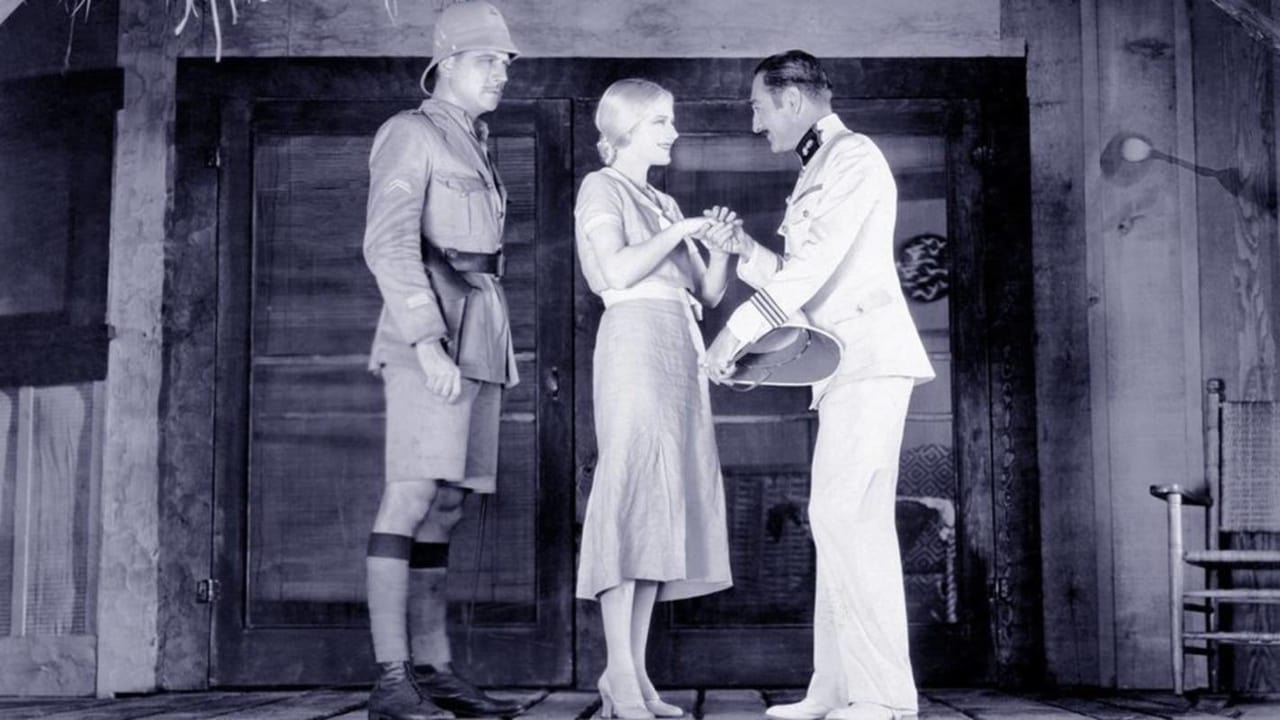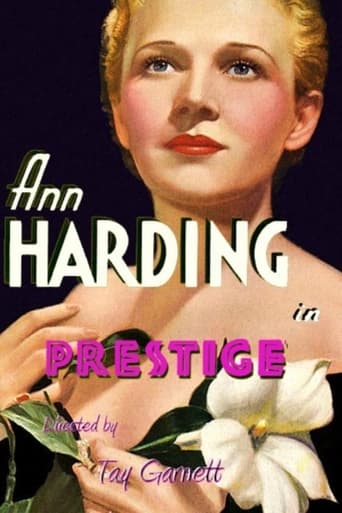

Lack of good storyline.
... View MoreIt's fun, it's light, [but] it has a hard time when its tries to get heavy.
... View MoreAll that we are seeing on the screen is happening with real people, real action sequences in the background, forcing the eye to watch as if we were there.
... View MoreThe movie turns out to be a little better than the average. Starting from a romantic formula often seen in the cinema, it ends in the most predictable (and somewhat bland) way.
... View MoreMelvyn Douglas and Ann Harding star in this odd little outing. I say odd because it's supposed to take place mostly in Vietnam at Lao Bảo Prison. But, it makes you wonder why some of the 'natives' are black---such as Clarence Muse! I wonder if folks back in the 1930s had no conception of what Southeast Asians looked like or if the studio was just being extremely sloppy. The film is also odd because it was filmed about 20 minutes from my house--in Venice, Florida. Considering all the palm trees, it probably was a pretty good substitute for going overseas for the filming.The film begins in France. A commandant of an overseas French penal colony is being court martialed and Douglas is one of the judges. Ironically, after finding this man derelict in his duties, Douglas himself is sent on a similar assignment to run a prison along the Mekong River. This means his fiancée will have to eventually join him--and Harding's character arrives more than a year later. By then, her sweetie has degenerated significantly--showing serious signs of mental illness and alcoholism. Apparently he is NOT adjusting well to this life. What's next? See the film."Prestige" suffers mostly because the acting is a bit too florid--with Douglas showing a lot of googly eyes and looking pretty goofy. In addition, you are expected to like the French but can't help but see them as interlopers--and the characters aren't all that likable either. And, oddly, despite the crazed performance, the film is often a bit dull. Not a terrible movie---but also not a particularly good one, either.
... View MoreThis 1931 film held my interest for about 30 minutes into the film which was filmed on location in Venice, Florida instead of a Indochinese jungle location. Lt./Capt. Andre Verlaine, (Melvyn Douglas) intends to marry a woman he is very much in love with and is given news that he is going to be assigned to a penal colony and there is no place for a woman to live. The woman is Therese Du Flos Verlaine, (Ann Harding) who is very upset about this assignment by the British Army. However, Capt. Remy Boudoin, (Adolphe Menjou) is very interested in Therese and is the man sending Andre to this penal colony to separate him from his love and seek her attention for himself. This story drags on with lots of boozing by Andre and he begins to lose respect from his fellow soldiers who are all natives. If you like Ann Harding and Melvyn Douglas, this is the film for you.
... View MoreFor those interested in prevailing (or at least socially acceptable) American attitudes toward Third World colonial territories and non-white races in 1932, this film is a potent educational tool. Melvyn Douglas plays a French army officer who is assigned to supervise a prison camp in the boonies of Indochina, the inmates of which seem to spend half their time drinking and gambling and the other half lying on their backs in a barracks with their feet manacled. Douglas, whose character disintegrates into alcoholism from the relentless heat, humidity, isolation and boredom of his post, leaps from one emotional state to the next; he hits each note with power and gusto, but there is no gradation between the notes, giving his behavior an unstable, almost schizophrenic effect; one wonders if this was the fault of the script, the director, the editor or Douglas himself. Ann Harding as the sweetheart who follows him to Indochina and Adolphe Menjou as a rival French officer deliver their standard performances. Director Tay Garnett indulges in frequent tracking shots and almost constant dollying and wobbling around furniture, doorways, mirrors or whatever is available. Yet somehow the film has a sluggish feel. The soundtrack of the print I saw on TCM has deteriorated so that some dialogue exchanges are difficult to understand.Early on Ian MacLaren as Harding's father (also an army officer) explains to her that the most important thing to remember while in Indochina is the "prestige" of the white race. This concept echoes throughout the film as Harding repeatedly reminds Douglas to keep his head up, i.e., physically embody his racial prestige. Indochina itself, as represented on what must be the RKO-Pathe back lot, is populated mostly by not only Asians but also by other non-white races. Douglas's personal servant (Clarence Muse) is black. Perhaps the French, for their own reasons, shuffled their non-white subjects from one colony to another or the filmmakers ran out of Asian extras and thought any other non-Caucasians would do as "natives." For tropical atmosphere, there is the inevitable brief shot of crocodiles plopping into a river as well as a shot of a swarm of ants on a table where Harding has left an open box of chocolates (why the candy hadn't melted to syrup in the umpteen hours/days she has been traveling upriver in the tropics is not explained). Toward the end, during a mutiny, Douglas manages to intimidate an armed, seething mob by holding his head up, removing his gun and marching through them, swiping various menacing individuals on the face with his whip, causing them to draw back. For some reason never made clear, there are repeated shots of natives operating a huge water wheel; it's picturesque. All of the characters except Harding and Menjou are seen sweating profusely in every shot. Strange, because these two actors are the most overdressed for the climate.
... View MoreTherese Des Flos, a beautiful young woman, is in love with Andre Verlaine, a captain in the army. She is also pursued by another officer, Remy Baudain. When Andre is assigned to a post in Indochina, Therese's world goes to pieces. Andre has not married her because of his impending stint, but Therese convinces her father, who is in charge of this division, to let her follow Andre.Things aren't exactly easy for Andre, who falls into a despair by the heat and perhaps his boredom at this forsaken place. He doesn't endear himself to the native troops he commands to guard the prisoners at the lock up. When Therese arrives, she is horrified to see the change in Andre, but they go ahead with the plans to marry. Remy, who has come to the compound, is also completely surprised by what's going on and asks Therese to go back to Saigon with him. As she is about to leave, she discovers that Remy has been killed. Everything points to Nham. Ultimately, Andre gets some of his all self back when he is wounded and he and Therese come to the realization they belong to one another."Prestige" is a curiosity film directed by Tay Garnett, a man who always delivered. This RKO-Pathe picture belongs to an era when stories such as this one had no interest in being politically correct, as shown by Andre's attitude toward the natives, who he seems to hate. Even his loyalty toward his servant is put to a test where he shows no compassion either. The film portrays the native men in silly costumes, and even Nahm is black, something that might have been quite a shock for the Indochina of those years. The costume department decided to dress the women in Jantzen swimwear instead of the traditional robes.Ann Harding is appealing as Therese. Adolph Menjou also has some good moments. We didn't care much for the Andre of Melvyn Douglas, but this is only our opinion. Rollo Boyd, Ian McLaren and the great Clarence Muse are seen in key roles."Prestige" is a film to watch by fans of Tay Garnett.
... View More